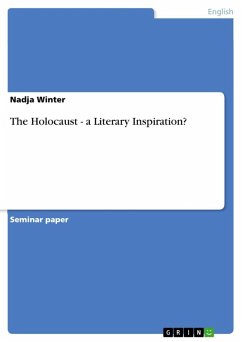Seminar paper from the year 2004 in the subject English Language and Literature Studies - Literature, grade: 2,0 bzw. 64 % (B), University of Newcastle upon Tyne (School of English Literature, Language, and Linguistics), course: Seminar, language: English, abstract: Half a century after the last liberation of the death camps in 1945, which were located in a vast part of Europe, it is not just scientists and historians who are still interested in the Holocaust, one of the most traumatic events of modern European history. For the rest of us, Holocaust literature is seemingly a helpful method to reveal testimonies and survivor experiences. Thus, this topic has reached a certain status in literature. Today, a huge variety of texts deal with the Holocaust in multi- faceted ways, which cover nearly all literary genres. This essay will primarily concentrate on the works of Anne Frank ('A Diary of a Young Girl'), Charlotte Delbo ('Auschwitz and After') and Art Spiegelman ('The Complete Maus'). The second focus, then, will be on Primo Levi's 'The Drowned and the Saved', who was also studied on the module. These texts are outstanding and inimitable in how they treat the Holocaust, how they have reached people's hearts and minds, and how other people began to deal with the happenings of these dreadful times after their publication. All texts represent examples of different literary genres like Anne Frank's diary, or Art Spiegelman's comic book. Charlotte Delbo's work combines three types of literature in one masterpiece, namely prose, poetry and drama; whereas Levi's account is a more or less philosophical analysis of the question why all this could happen. However, reading such literature does not automatically imply that the Holocaust in itself can fully be understood. On the contrary, it can only provide a way of approaching the circumstances, which millions of prisoners endured. Hence, many Holocaust survivors tried to use the art of writing to overcome the terrifying things they had seen and - most of all - the things they had to endure physically and psychologically in the concentration and death camps, or in the Jewish ghettos, and from which they had and still continued to suffer. They had to struggle between the desire to forget, but yet face the memory every day, and the impulse to remember, uncover, and record every detail of its reality. To speak about the unspeakable seemed impossible. "Bearing witness, therefore, was not likely to be the first thing on the inmate's mind". 1 How was it that not just those who suffered under Hitler's regime, but the second generation, their children, were able to find the will to write down their testimonies? [...] 1 Reference Guide, p. 339
Dieser Download kann aus rechtlichen Gründen nur mit Rechnungsadresse in A, B, BG, CY, CZ, D, DK, EW, E, FIN, F, GR, HR, H, IRL, I, LT, L, LR, M, NL, PL, P, R, S, SLO, SK ausgeliefert werden.









